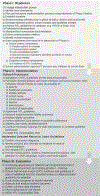Strategies to Address Unmet Needs and Facilitate Return to Learn Guideline Adoption Following Concussion
- PMID: 28463445
- PMCID: PMC8570132
- DOI: 10.1111/josh.12510
Strategies to Address Unmet Needs and Facilitate Return to Learn Guideline Adoption Following Concussion
Abstract
Background: Many students do not receive return to learn (RTL) services upon return to academics following a concussion.
Methods: Using a mixed-methods approach, we conducted a survey of RTL practices and experiences in Washington State schools between January 2015 and June 2015. We then held a statewide summit of RTL stakeholders and used a modified Delphi process to develop a consensus-based RTL implementation model and process.
Results: Survey participants included 83 educators, 57 school nurses, 14 administrators, and 30 parents, representing 144 schools in rural and urban areas. Unmet need domains and recommendations identified were (1) a current lack of school policies; (2) barriers to providing or receiving accommodations; (3) wide variability in communication patterns; and (4) recommendations shared by all stakeholder groups (including desire for readily available best practices, development of a formal school RTL policy for easy adoption and more training). Using stakeholder input from RTL summit participants and survey responses, we developed an RTL implementation model and checklist for RTL guideline adoption.
Conclusions: Washington State children have unmet needs upon returning to public schools after concussion. The student-centered RTL model and checklist for implementing RTL guidelines can help schools provide timely RTL services following concussion.
Keywords: academic accommodations; concussion; return to learn (RTL) services; traumatic brain injury (TBI).
© 2017, American School Health Association.
Figures
References
-
- Kerr ZY, Register-Mihalik JK, Marshall SW, Evenson KR, Mihalik JP, Guskiewicz KM. Disclosure and non-disclosure of concussion and concussion symptoms in athletes: review and application of the socio-ecological framework. Brain Inj. 2014;28(8):1009–1021. - PubMed
-
- Kay MC, Welch CE, McLeod TCV. Positive and negative factors that influence concussion reporting among secondary-school athletes. J Sport Rehabil. 2015;24(2):210–213. - PubMed
Publication types
MeSH terms
Grants and funding
LinkOut - more resources
Full Text Sources
Other Literature Sources
Medical




